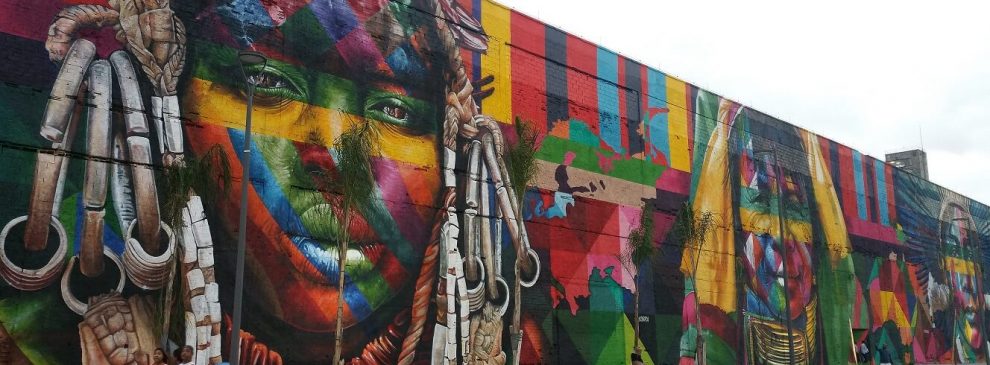Reimaging Brazilian cities: Urban images and cultural narratives in the wake of the Rio 2016 Olympic Games (2017)
The British Academy Newton Fund grant awarded for a year-long project collaboration between Dr Beatriz Garcia and a team of researchers at the University of São Paulo, led by Professor Paulo Nassar, has now come to an end. The project assessed the impact of mediated cultural representations on the “brand” of Brazil and Rio de Janeiro in the wake of the 2016 Olympic Games.
The project sought to reveal whether the huge investments of both money and human resources in organising the Games had any durable impact on the image of the host city and country — and if so, what this impact was. Specifically, the team analysed the impact of the 2016 Olympic Games on perceptions of Brazil and Rio from a cultural and creative industries perspective.
Methodology
Methodologically, the project has focused on the analysis of official written and visual materials, using the following techniques and documentary sources:
- 7 interviews were conducted with Games organisers
- 5 focus groups were held with journalists, cultural experts, and political experts
- Media content analysis involved 331 Brazilian articles and 147 UK articles, which focused on Rio winning the bid (2009), a year before (2015), the year of the Games (2016), and post-Games (from December 2016 and the start of 2017)
Project legacy
The project has also created an opportunity for long-term collaboration between the UK’s leading researcher on mega-event cultural impacts and Olympic cultural policy-making, and a team of Brazil’s leading international public relations and narratives researchers. The project culminated in a conference led by Dr Garcia and Prof. Nassar on 17th August, held in Rio’s Museum of Tomorrow, one year on from the Games. The research has also involved the regular publication of papers and media interest in Brazil in particular, all listed at the end of this post.
Significant findings
- The research undertaken has revealed that Rio and Brazil’s cultural narratives have struggled to be revealed amidst a backdrop of negativity, exacerbated by economic, social, and political problems, which intensified in particular from 2015 onwards
- However, the media produced in Brazil and the UK during period of the Games themselves had an overall more positive focus during a time in which both presses more frequently foregrounded the subject of culture and cultural activity linked to Rio 2016
- Nevertheless, despite this enthusiasm towards Brazil’s cultural narrative at the time, socio-political and economic issues combined obfuscated the strategic communication of a cultural dimension to the Games, and distracted from the development of any form of cultural legacy post-Games
- Nonetheless, evidence of a symbolic narrative has been identified in some successful initiatives from Rio 2016, such as The Olympic Boulevard, the IOC-led Artist in Residence programme, and the Opening Ceremony. However, the prospective positive cultural legacy of such initiatives became increasingly insignificant as a lack of coverage which immediately followed the Games erased the long-term significance of these cultural moments
Team publications
Carbonaro, T. (2016) ‘Beatriz Garcia o legado cultural e tao importante quanto o fisico’
Garcia, B (2016) ‘On the need for both black and white narratives around mega-event’ impacts
Garcia, B. (2016) ‘Why art needs to retake the Olympic stage’
Garcia, B. (2016) ‘The Cultural Legacy is as Important as the Physical’
Garcia, B. (2016) ‘The Olympic Games’ varied layers of Cultural Programming’
Garcia, B. (2016) ‘What counts as #OlympicArt during the Rio 2016 Olympic Games?’
Garcia, B. (2016) ‘Sites for culture and art in the Olympic city’
Garcia, B. (2016) ‘Olympic Artists in Residence’
Garcia, B. (2016) ‘Think broccoli? Think again: the extraordinary work of Burle Marx’
Garcia, B. (2016) ‘Don’t believe the doom mongers – the Olympics have changed Rio for the better’
Garcia, B. (2017) ‘Cultural legacies of Rio 2016, one year on’
Garcia, B, and Nassar, P. (2017) ‘O texto e o contexto’
Peate, A. (2017) ‘Urban images and cultural narratives after the Rio 2016 Olympic Games’
Peate, A. (2017) ‘ICC Director Dr Beatriz Garcia in Brazil to present research findings on cultural narratives in the wake of Rio 2016′
Media attention and outputs
‘Reputação do Rio após olimpíada tem saldo negativo diz pesquisa’
http://exame.abril.com.br/brasil/reputacao-do-rio-apos-olimpiada-tem-saldo-negativo-diz-pesquisa/
‘Legado cultural dos jogos olímpicos do Rio história um ano depois’
http://www.aberje.com.br/calendario/legado-cultural-dos-jogos-olimpicos-do-rio-historia-um-ano-depois/
‘Estudo inédito avalia o legado cultural dos Jogos Rio-2016’
http://blogs.correiobraziliense.com.br/servidor/estudo-inedito-avalia-o-legado-cultural-dos-jogos-rio-2016/
‘Estúdio VEJA’ recebe Tato Carbonaro, um dos responsáveis pela pesquisa “Legado Cultural” da Olimpíada do Rio’
https://www.facebook.com/veja/videos/10155273736315617/
‘Estudo inédito avalia legado cultural dos jogos rio 2016’
http://noticias.r7.com/record-news/jornal-da-record-news/videos/estudo-inedito-avalia-legado-cultural-dos-jogos-rio-2016-10082017
‘Parceria entre ECA e o Instiute Cultural Capital realiza estudo inédito dito analisando o legado’
http://www3.eca.usp.br/noticias/parceria-entre-eca-e-o-institute-cultural-capital-realiza-estudo-dito-analisando-o-legado
‘Rio 2016 não deixou legado cultural, afirma estudo’
http://www.panrotas.com.br/noticia-turismo/brasil/2017/08/rio-2016-nao-deixou-legado-cultural-afirma-estudo_148490.html
‘Väkivallan kierre korvasi kisariehan – Vuosi olympialaisten jälkeen Rio on yhä turvattomampi’
https://yle.fi/uutiset/3-9766671
Research team members
Dr Beatriz Garcia, Project Lead, The University of Liverpool
Professor Paulo Nassar, Project Lead, The University of São Paulo and Aberje (The Brazilian Association of Business Communication)
Mr. Tato Carbonaro, Researcher, The University of São Paulo and Aberje
Miss. Cínthia Leone, Researcher, The University of São Paulo
Dr Ailsa Peate, Researcher, The University of Liverpool












